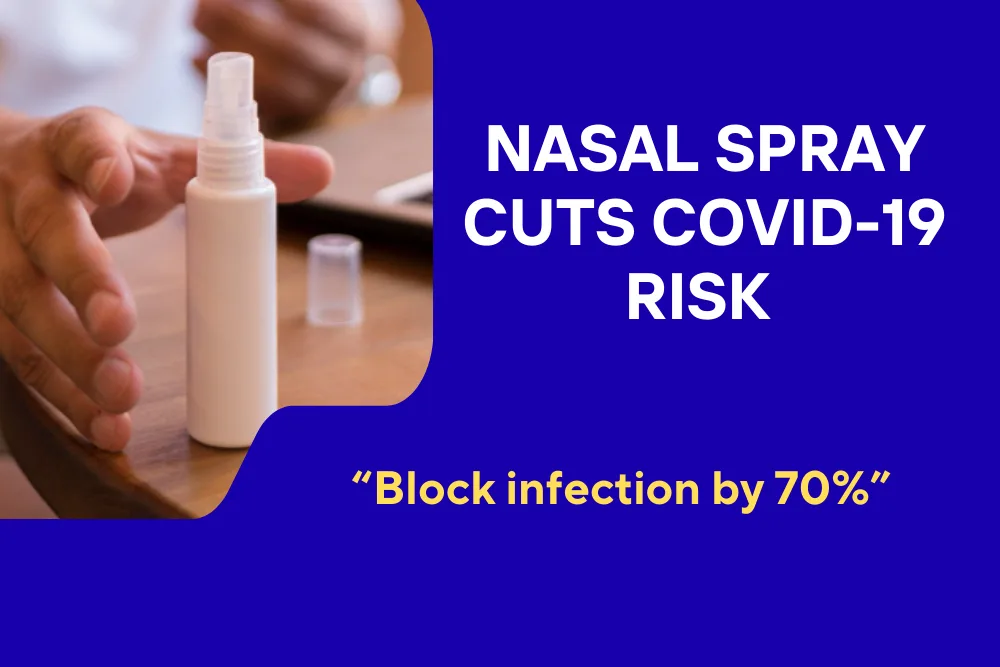Now Reading: OTC Nasal Spray Found to Reduce COVID-19 Risk by 70%
-
01
OTC Nasal Spray Found to Reduce COVID-19 Risk by 70%
OTC Nasal Spray Found to Reduce COVID-19 Risk by 70%

A common over-the-counter allergy nasal spray may do more than relieve hay fever. A recent clinical trial has shown that azelastine, the active ingredient in this spray, can reduce the risk of COVID-19 infection by 70%. The findings suggest that a widely available product could serve as an affordable and convenient additional layer of protection alongside vaccines.
Professor Robert Bals, MD, Director of Saarland’s Department of Pulmonology, Allergology, Respiratory Intensive Care and Environmental Medicine, highlighted the importance of this discovery. According to him, azelastine nasal spray may be particularly helpful for vulnerable groups during periods of high infection or before traveling.
Inside the Clinical Trial
The trial involved 450 healthy adults with an average age of 33. Nearly all participants had already received COVID-19 vaccinations. They were randomly assigned either azelastine (0.1%) nasal spray or a placebo. Participants used the spray three times daily for 56 days, and during times of exposure or symptoms, they were allowed to increase usage to five times daily for three days.
Testing was rigorous. Everyone was screened with rapid antigen tests twice a week, and any positive results were confirmed with PCR testing. In addition, participants showing symptoms but testing negative were further tested for a wide range of respiratory viruses.
The Results: Lower Infections and Delayed Onset
The results were striking. In the azelastine group, only 2.2% of participants contracted COVID-19, compared to 6.7% in the placebo group. This equated to about a 70% lower risk of infection. Symptomatic cases were also significantly reduced: 1.8% in the treatment group versus 6.3% in the placebo group.
Azelastine appeared to delay infection as well. On average, it took 31 days for participants in the treatment group to contract the virus, compared to 19 days in the placebo group. Beyond COVID-19, the nasal spray reduced other respiratory infections, including the common cold. Overall respiratory infections were recorded at 9.3% for the azelastine group, compared to 22% in the placebo group.
Why Might Azelastine Work?
Researchers are still investigating how azelastine provides this protective effect. Two leading theories suggest it may either bind to the virus in the nasal mucosa and inhibit key enzymes for replication, or interact with the ACE2 receptor, the pathway COVID-19 typically uses to enter human cells. Both mechanisms would prevent the virus from establishing infection in the respiratory tract.
Safety and Side Effects
The spray demonstrated a strong safety profile. Reported side effects were mild and already known for azelastine, including a bitter taste, occasional nosebleeds, and tiredness. Serious adverse events were rare and not linked to the nasal spray.
Practical Implications and Accessibility
With its affordability, over-the-counter availability, and ease of use, azelastine nasal spray could become a practical preventive tool during times of high community transmission, crowded indoor events, or travel. However, access may depend on local regulations. In certain states such as New York and Washington, DC, pharmacies like CVS now require prescriptions for COVID-19 vaccines due to regulatory requirements, which complicates how preventive products are provided to the public.
Bottom Line
The findings from this clinical trial position azelastine nasal spray as a promising, accessible option to reduce COVID-19 risk. While it should not replace vaccination or other protective measures, it may serve as a valuable addition, especially in high-risk environments. As researchers continue to explore its mechanisms, azelastine stands out as a simple, scalable tool that could help communities stay safer during times of elevated infection rates.
FAQs
What is azelastine?
Azelastine is an antihistamine commonly used in nasal sprays to treat allergy symptoms.
How effective is azelastine against COVID-19?
In a clinical trial, azelastine nasal spray reduced the risk of COVID-19 infection by about 70% compared to placebo.
Is azelastine safe to use?
Yes. Reported side effects were mild, including a bitter taste, occasional nosebleeds, and tiredness. Serious side effects were rare.
Can azelastine replace vaccines?
No. Vaccines remain the primary defense against COVID-19. Azelastine may provide additional protection but should not be considered a substitute.
Is azelastine available over the counter?
Yes, but access may vary depending on regional regulations and pharmacy rules.
You may also love to hear about The Japanese Walking Method for Better Work-Life Balance
Dony Garvasis is the founder of Search Ethics, a platform dedicated to transparency, authenticity, and ethical digital practices. With over 8 years of experience in SEO and digital marketing, I provide expert content on Tech, digital marketing, SEO, Artificial intelligence, gadgets, science, automobiles, lifestyle, tips, tutorials and much more. My mission is simple: Ethical Search, Genuine Results! I will make sure people everywhere get trustworthy and helpful information.










